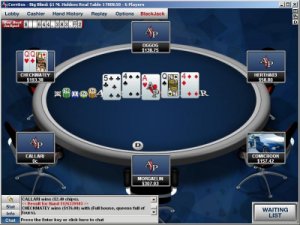Purported Absolute Poker Owners Try to Block U.S. Government Seizure

 In an intriguing court battle in New York last week, the “true” owners of Absolute Poker filed a motion to contest the seizure of the assets of the company by the U.S. Department of Justice.
In an intriguing court battle in New York last week, the “true” owners of Absolute Poker filed a motion to contest the seizure of the assets of the company by the U.S. Department of Justice.
In front of Judge Leonard Sand in the Southern District of New York on September 4, the allegedly true owners of Absolute Poker appeared alongside attorneys for the Federal Government to argue their cases. Attorney Leonard Rodes of the New York law firm Trachtenberg, Rodes, and Friedberg represented the Portuguese holding company Avoine-Servico de Consultadoria e Marketing, which claims to be the rightful owner of the assets of Absolute Poker.
Rodes claimed that the Federal Government has not proven its case for the seizure of Absolute’s assets. Rodes also introduced to Sand the “skill” aspect of poker, referencing the recent decision in the Eastern District of New York in the case of U.S. vs. Dicristina that overturned the conviction of a Staten Island man for gambling charges due to the skill nature of the game of poker.
 The same attorney, following the lead of counsel for Howard Lederer (pictured), has sought to apply the Dicristina ruling to show that their clients weren’t violating the laws of the United States regarding gambling. The DOJ has disputed Lederer’s application of the ruling.
The same attorney, following the lead of counsel for Howard Lederer (pictured), has sought to apply the Dicristina ruling to show that their clients weren’t violating the laws of the United States regarding gambling. The DOJ has disputed Lederer’s application of the ruling.
Jason Cowley, the attorney representing the U.S. Government in this case, had a sizeable amount of ammunition to return fire against Rodes’ claims. Cowley pointed out the convoluted trail of alleged ownership of the company for several years. First thought to be owned by creator Scott Tom, then by Tokwiro Enterprises and former Kahnawake Gaming Commission leader Joe Norton, and then by the Caribbean company Blanca Games, Absolute Poker appears to have traded hands quite a few times.
Cowley pointed out that the Portuguese group (allegedly representing Tom) had previously stated that it was not involved in any way with Absolute Poker. He also pointed out that while the Dicristina ruling has been made, it has not yet been applied to any of the Black Friday lawsuits.
In an interesting sidelight to the legal wrangling last week, Rodes challenged the fact that the Department of Justice was looking to obtain Absolute Poker’s assets from a third party. This group, a Korean firm that allegedly serviced the software, has offered the Federal Government a copy of the Absolute Poker program. Rodes claimed in court that this copy was a case of “wrongful possession” and should be disallowed.
 Oddly not mentioned in the arguments in front of Sand were the assets of Absolute Poker’s sister company on the CEREUS Network, UB, which was also a part of the April 2011 crackdown by the Federal Government. Also not mentioned was the status of player accounts on Absolute Poker or UB and whether there would be any payback.
Oddly not mentioned in the arguments in front of Sand were the assets of Absolute Poker’s sister company on the CEREUS Network, UB, which was also a part of the April 2011 crackdown by the Federal Government. Also not mentioned was the status of player accounts on Absolute Poker or UB and whether there would be any payback.
The battle in the New York courts is critical for both sides. For Avoine, maintaining the ownership of the Absolute Poker software and player database would be critical if the company were to get any return in a sale of its property. For the Feds, the seizure and sale of those same assets would bring in money toward settling the Black Friday lawsuit against Absolute Poker, which is facing over $100 million in potential fines and settlement costs. The problem with the sale of the assets of Absolute Poker is that, as time goes by, the value of those assets likely diminishes, something that both sides realize.
After hearing the arguments last week, Sand did not immediately make a ruling on the issue. There is no schedule set for any decision regarding the arguments, leaving another chapter in the Black Friday saga still open.




